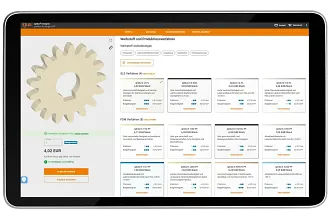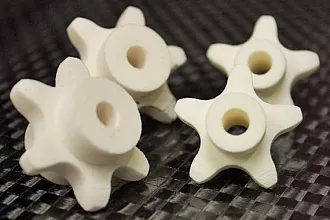Change Language :
Additive manufacturing processes at igus®
3D printing with self-lubricating plastics for wear-resistant parts
Additive manufacturing processes are part of digital production. Regardless of 3D printing method, each new component must first be designed as a digital 3D model, which can then be used for production without the need for further component-specific tools. This process offers numerous advantages:
- 3D models can be shared and processed by multiple specialists
- Manufacture can be offered locally: igus® offers 3D printing service worldwide
- Modifications to components can be made quickly and without additional charge,
- Simple geometries and standard components can be designed quickly and easily on free-of-charge software; no previous experience necessary
- In our 3D printing service, wear-resistant plastic components can be manufactured using three different processes: SLS, FDM and DLP 3D printing. On this page you will find further information on the respective manufacturing methods.
- Selective laser sintering (SLS)
- Fused deposition modelling (FDM)
- Digital light processing (DLP)
- The manufacturing processes in practice
Different additive manufacturing processes at igus®
Selective Laser Sintering (SLS)
In SLS 3D printing, plastic powder is applied in layers using a doctor blade and melted with a laser at the point where the component is to be created. This process is characterised above all by its cost-effectiveness, fast production and high dimensional accuracy of the printed components(from ± 0.15 mm).
Further advantages:
- Strength and good layer bonding
- Tough, elongation at break greater than 8
- Filigree components with a wall thickness of up to 0.7 mm can be realised
- Printing service worldwide, igus® SLS systems in Germany, China and the USA
Tip: Compared to the SLS process, FDM 3D printing offers a greater variety of materials.
Fused Deposition Modelling (FDM)
FDM is a 3D printing process in which a meltable material (plastic) is heated and applied layer by layer via one or more nozzles. This is also referred to as filament deposition or filament extrusion. The inexpensive purchase of a filament printer and the simple handling make FDM the most widely used 3D printing process.
Special services at igus®:
- Multi-material printing: In the 3D printing service, it is possible to produce parts from up to four different filaments in one printing process.
- Large-format 3D printing: In the large-format 3D printer from igus®, components up to 1 metre in size can be additively manufactured.
Tip: If support material is to be dispensed with and components with a high layer bonding and higher dimensional accuracy (< ±0.2 mm) are required, the SLS and DLP processes are better suited than FDM.
Digital Light Processing (DLP)
DLP is a 3D printing process in which layer after layer of synthetic resin is exposed to UV light in a tank and thereby cured or polymerised. A UV light source hits an array of mirrors, which reflect the light as a two-dimensional layer geometry and cast it onto the material.
Advantages:
- High print resolution of up to 35 µm
- Isotropic mechanical specification (no disadvantages in strength due to the layer structure)
- Clean and smooth surface
- Possible areas of application: gears with tooth modulus 0.2 and special components that require filigree recesses, internal channels or the finest holes
DLP vs SLA:
A major advantage of 3D printing using the DLP process is the time saved. Compared to the SLA process, in which each point is individually exposed by a laser, the resin is cured surface by surface in the DLP process, thus reducing the construction time many times over. In addition, the resolution is significantly increased with up to 35 µm pixels.
The manufacturing processes in practice

The online 3D printing service
Have your prototypes or series printed from wear-resistant igus®-plastic in 1 to 3 days.
More about the 3D printing service
3D printing process in use
Get an overview of the areas of application in which the igus® 3D printing service has played a decisive role.
Go to application examplesContact us
Contact details

Alan Hicks07467 956571Submit form
Opening hours
Office hours
Monday to Friday from 8 am - 8 pm.
Live chat:
24h